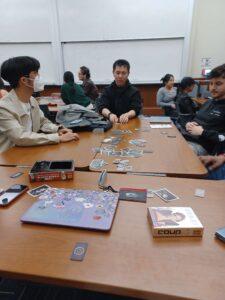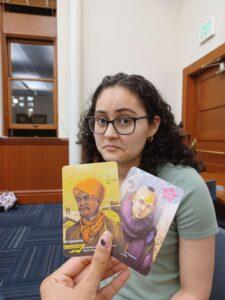
For this week’s Critical Play, I went to Game Night and played The Resistance. The Resistance is a card-based board game with specialized cards and tokens. Although reading through the rules and understanding them took around 5-10 minutes, it was relatively easy to conceptually understand once we began gameplay. The game was developed by Don Eskridge, and I believe that the targetaudience would be older teens, usually in a party setting. To make it stand out from other similar social deduction games, I believe the ‘resistance’ theme appeals to young adult men, perhaps with the opportunity to specify ‘the resistance’ to the resistance that exists in Star Wars.
The larger objective of the game is to outwit the players of the opposing team, but within that objective lies the sub-objective of consensus between players. This objective, plus the unique procedures surrounding the missions, allows for a very strong social deduction game.
To win the war against the Imperial empire from the Resistance side, the resistance members must identify who the true Resistance members are and who the Imperial spies are. This requires outwitting the spies in the game to discover what role they really play. This objective directly supports the social deduction category of the game. The game also requires democratic voting as a procedure to approve each team before they go on the mission. This voting system prompts discussio

n as players try to defend their vote and encourage the leader to choose teammates that they trust. The ability to (or rule to) choose to fail or succeed in a mission, essentially bluffing and blending in as a resistance member, also allows deception of the other players. The objectives of outwitting other players and the procedure of democratic voting, both which prompt inter-p
layer discussion, are aspects of the game that emphasize fellowship. As an aside, I would say that this game promotes ‘anti-fellowship’ more than true fellowship, as it’s heavily rooted in the skills of acting, gaslighting, lying, and deception. In the middle of the game, Rishi commented “One of you two will walk away from this not trusting the other roommate..” to myself and Emily, which turned out to be very true as Emily had been the secret spy and I have since had a difficult time trusting her (/hj).
With my experience in playing similar social deduction games such as Mafia, Coup, and Among Us, I am able to compare these games and understand what specific aspects of The Resistance made it an effective social deduction game. Firstly, unlike Mafia, The Resistance has no silent periods. This significantly aids the awkwardness aspect experienced in Mafia when you are playing in a group of strangers. With no silent periods, discussion is encouraged and expected. Furthermore, the elimination of the player elimination aspect kept the magic circle intact. This allowed all players to feel engaged in the collective conversation and not feel left out once they died (such as in Mafia, Coup, and Among Us). It also allowed for the pool of prospective spies to never dwindle, which made the game slightly more challenging. However, a criticism I would have is that in the game I played, my group had 7 total players – making the balance between resistance members and spies 4:3. This, in my opinion, was too many spies and favored their win. Had there been only two spies, I (perhaps naively) think that the resistance might have had a better chance of winning. Furthermore, the actions that players take throughout the game are very simple (choosing a card, voting yes or no) and get repetitive for resistance members because they must always choose to succeed in the mission. In one round of voting, my group member Francis chose to disapprove a team just for ‘added spice’ because he was unengaged by only approving teams. In comparison to Among Us, The Resistance is much less engaging because Among Us has tasks that change and are engaging and have some level of difficulty. In comparison to Mafia, the simple tasks are better than no tasks at all. I believe that the tasks might be improved if the resistance members are given the opportunity to fail a mission, and if all players fail the mission, the mission actually succeeds. This would require even more discussion as well as gambling and/or bluffing as players would have to trust that other players are on their team, and that they understand the play that other players are choosing to do.



